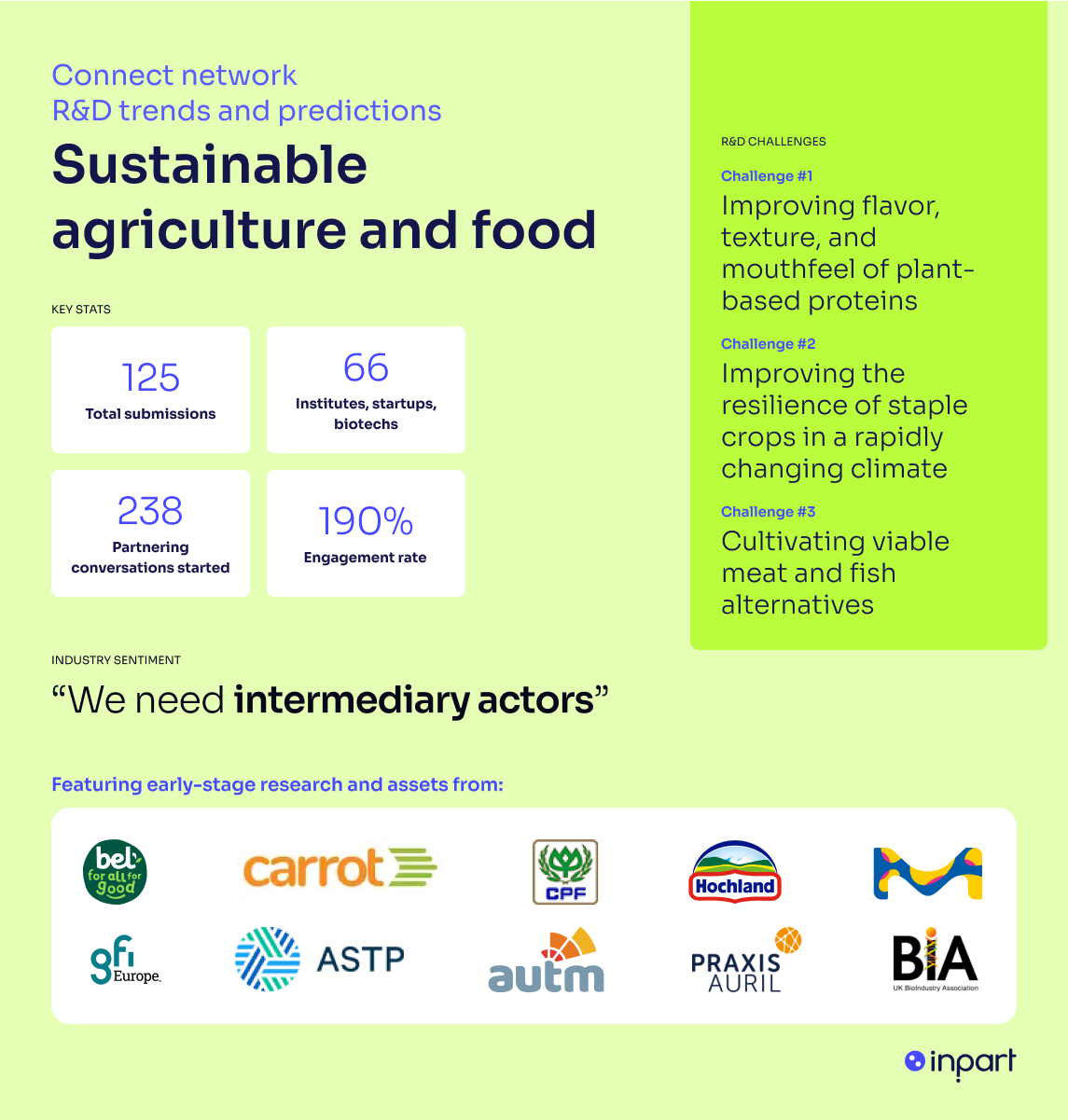This report surfaces exclusive R&D trends in sustainable agriculture, crop science, and alternative proteins from our latest Global Challenge campaign.
Sustainable agriculture and food: R&D trends
Our Global Challenge campaign ran from March - June 2024, uncovering cutting-edge science and assets to sustainably feed global populations. The trends and breakthroughs identified in the report arise from analyzing the engagement from R&D and external innovation teams using our online partnering platform to identify new partners.

Key R&D trends in sustainable agriculture and food production
It's estimated that food production will need to increase by 70% by 2050 to feed the growing global population. Yet, much of the world's arable land is already at full capacity, with non-renewable natural resources being depleted, and crop yields stagnating or falling. Our current food production methods already contribute to 34% of greenhouse gas emissions globally, which could add nearly 1°C to global temperatures by the end of the century, 75% of which is driven by foods that are high sources of methane: meat, dairy, and rice.
Key to meeting the challenge of feeding changing global populations in a sustainable and nutritious way is innovation in farming methods, creating more resilient food ecosystems, as well as adapting our diets to consume protein and nutrition from more sustainable sources.
The challenge of improving the appeal of plant-derived proteins through taste, texture, and mouthfeel, while keeping manufacturing and retail costs competitive, is essential for the uptake of sustainable protein alternatives.
This is a high priority for industry, especially in the plant-based 'dairy' products that several big players are focusing their R&D efforts on. Key to achieving this is improving fat profiles, by creating and encapsulating new plant-based fat sources mimicking animal fats.
Extreme weather across the globe is impacting crop yields, while demand for staple crops, such as rice, will increase by a third by 2050.
There is high demand from industry for new technologies and approaches to develop climate-resilient crop strains. However, the historical approach of using chemical fertilizers to help crops resist abiotic stresses can have negative effects on crop quality, plant size, and diameter of fruits, tubers, or leaves. These fertilizers are also polluting the environment and our food with microplastics.
The emerging 'clean meat' sector has enjoyed a rapid acceleration in research and innovation in the last 10 years, but our partners identified numerous technical challenges ahead for researchers and companies working to bring early innovations into products on the market.
One challenge identified was how to scale up the manufacturing of cultivated proteins in a sustainable and cost-effective way. The availability of good-quality cell lines at an economical price point will enable the cultivated meat industry to address many of its current challenges.
Top 6 breakthrough innovations
Review a sample of the six highest performing projects and assets submitted to the Global Challenge, hosted on our online partnering platform. Download the report to reveal the full ranking of the most impactful academic projects and biotech assets.
To read the full brief of each project featured in the report, and to engage with the teams behind them, you will need to create an account to enter the platform.
1. Biodegradable Barrier Coating for Sustainable Packaging
Michigan State University has pioneered a biodegradable barrier coating for paper using biobased, PFAS-free materials. This innovative coating offers superior grease and water repellency, making it ideal for sustainable packaging in fresh produce, dairy products, confectionery, and fast food. Compliant with TAPPI standards for repulpability and recyclability, it presents an eco-friendly alternative to traditional petroleum-based and PFAS coatings. This development supports sustainable food production by reducing packaging waste and enhancing recyclability.
2. Rapeseed Revolution: Tasty Dairy Alternatives for a Healthier Future
An R&D consortium including Danone, Frauenhofer, University of Warsaw, and NapifFeryn Biotech has developed high-quality, rapeseed protein-based drinks and yoghurts as sustainable dairy alternatives. Supported by EIT Food, these products provide nutritious, tasty options without the drawbacks of traditional plant proteins, such as poor emulsifying ability and off-flavors. Validated through consumer tests in the UK, Poland, and Germany, they outperform leading soy-based competitors.
These rapeseed-based products are clean-label, kosher, and non-GMO, offering a new sustainable choice for consumers, contributing to more eco-friendly food production and reducing dependence on traditional dairy farming.
3. Eco-Plastics: Turning Waste into Sustainable Biodegradable Resins
Ourobio introduces a sustainable technology to produce low-footprint, bio-based biodegradable plastic resins and additives, aimed at revolutionizing the packaging industry. Using engineered microorganisms, the process transforms dairy byproducts into high-performance polyhydroxyalkanoates (PHAs) that degrade rapidly, minimizing environmental impact. This technology co-produces biodegradable plastic resins and natural pigments in a single process, enhancing the sustainability of food packaging.
By utilizing waste-based feedstocks, Ourobio's innovation lowers production costs and carbon emissions, making it a significant advancement in sustainable agriculture and food production packaging. The project seeks partners to scale and market these eco-friendly materials.
4. Good Fat: Enzymatic Synthesis for Healthier Edible Oils
A new enzymatic technology has been developed by researchers at the University of Burgos to produce structured lipids with enhanced nutritional, organoleptic, and thermal stability properties. Utilizing lipases, this method offers an alternative to chemical treatments for modifying fats and oils, providing tailored nutritional and technological functions. By improving enzyme efficiency and stability through immobilization techniques, the process ensures the consistent production of beneficial fats and oils. This advancement enhances the quality and stability of edible oils and fats, addressing specific dietary needs, and reducing the risk of prevalent health issues such as cardiovascular diseases.
The technology enables the design of functional foods with specific nutritional benefits, promoting health and sustainability. By reducing reliance on chemical processes, it makes food production more eco-friendly. Opportunities for commercial agreements and technical cooperation are sought to further develop and adapt this promising technology.
5. Healthy Spread: Replacing Harmful Fats with Nutritious Alternatives
The Universitat Politècnica de València has developed a healthy solid fat product designed to replace traditional fats rich in saturated and trans fats. This innovative food product uses extra virgin olive oil and high oleic sunflower oil structured with hydrocolloids to create a spreadable fat that retains the sensory and structural characteristics appreciated by consumers. By utilizing polysaccharides and inactive yeast, the resulting emulsion maintains stability and flavor, offering a healthier alternative without compromising on quality.
This healthy solid fat is free of trans fats and saturated fatty acids, providing a superior fatty acid profile. It is ideal for use in spreads and baked goods, supporting sustainable and health-conscious food production. Partnerships are sought for scaling and commercializing this innovative product.
6. Fat Chance: FaTTy Cells Revolutionize Cultivated Meat Industry
Researchers at the Roslin Institute, University of Edinburgh, have developed FaTTy, an innovative pre-adipocyte cell line derived from pig fat, designed for the cultivated meat industry. This non-genetically modified cell line consistently produces mature fat cells (adipocytes) with 80-95% efficiency and can be expanded for over 250 population doublings. FaTTy addresses a critical need in cellular agriculture by providing a robust and scalable source of animal fat, which is essential for replicating the flavor, texture, and nutritional profile of traditional meat.
FaTTy offers immense potential for sustainable food production, reducing reliance on conventional farming and enhancing food security. Its high adipogenic capacity in both 2D and 3D systems, along with its ability to produce significant lipid accumulation, makes it an ideal candidate for developing cultivated meat products. The technology is available for licensing and co-development, presenting opportunities for industry and academic partnerships to advance cellular agriculture and create healthier, more sustainable meat alternatives.
Hear from the experts
Join us for a conversation with leading experts exploring current and future R&D trends in sustainable agriculture, crop science, and alternative proteins.



Connecting decision-makers
We connect academic institutes, researchers, companies and investors in a first-of-its-kind online network, unlocking the transformative power of science through partnering.